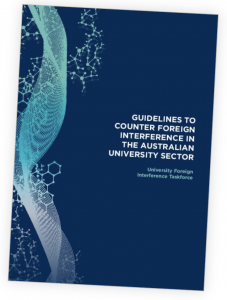Inquiry releases recommendations for higher education and foreign interference
By Rebecca Cairns
 Last week (25 March, 2022) the Parliamentary Joint Committee on Intelligence and Security (PJCIS), chaired by Senator James Peterson, released the recommendations of the inquiry into security risks affecting the Australian higher education and research sector. The report put the spotlight on Chinese foreign interference. It also reinforces that the protection of academic freedom in the higher education sector in Australia–and other countries–is an ongoing concern that has significant implications for our students and our work as researchers and educators.
Last week (25 March, 2022) the Parliamentary Joint Committee on Intelligence and Security (PJCIS), chaired by Senator James Peterson, released the recommendations of the inquiry into security risks affecting the Australian higher education and research sector. The report put the spotlight on Chinese foreign interference. It also reinforces that the protection of academic freedom in the higher education sector in Australia–and other countries–is an ongoing concern that has significant implications for our students and our work as researchers and educators.
Policy context
Australia’s first foreign interference laws were introduced in 2018 as the Foreign Influence Transparency Scheme Bill and focused on foreign interference in government and political process. Since then, the higher education sector has become a crucial space for navigating the impact of shifting geopolitical relations, and as indicated by the Australian Government’s inquiry, a policy focus area.
In 2019, the University Foreign Interference Taskforce (UFIT) was jointly formed by the higher education sector and the Australian Government. Then in 2020, the Parliamentary Joint Committee on Intelligence and Security (PJCIS) launched an inquiry into security risks affecting the Australian higher education and research sector, with terms of reference from the Minister for Home Affairs. In the interim, UFIT published the Guidelines to Counter Foreign Interference in the Australian University Sector (UFIT, 2021), which aim to ‘encourage universities to adopt measures to mitigate foreign interference risks’ (p.4), while recognising that ‘the majority of university international interactions are positive and benefit Australia’ (p.4).
The inquiry’s recommendations
The PJCIS inquiry made 27 recommendations and the report includes illustrations from the submissions made by universities, organisations and individuals. Five recommendations reinforce the UFIT guidelines, as indicated by the report advising, ‘adherence with the UFIT Guidelines is a good starting point for the sector’ (p.136).
Although China was not identified as the only ‘threat actor’ by ASIO in the report, numerous examples of threats and security risks are China-related. This emphasis in evident in the accompanying media release:
Among its recommendations, the Committee has recognised the risks associated with Chinese government-funded Confucius Institutes to academic freedom and student welfare, and calls on universities and the Foreign Minister to take steps to mitigate them. (PJCIS, 2022, para.4)
These risks were highlighted in this Guardian article and are addressed in Recommendations 6 and 7. Rather than recommending the closure of Confucius Institutes, the Committee advocates for greater transparency:
The Committee recommends that Universities who elect to host a Confucius Institute should disclose and make public details of those agreements and funding arrangements, and that at a minimum, Universities have a final say about the appointment of staff, curriculum content and that robust academic freedom and free speech clauses be included in any agreement. (PJCIS, 2022, p. xvi)
Other specific recommendations relating to China refer to the agreement Monash University has with the Commercial Aircraft Corporation of China (COMAC) (a state-owned company with Links to People’s Liberation Army) and the potential risk of information theft through talent recruitment programs, such as the Communist Party of China’s Thousand Talents Plan.
Human Rights Watch (HRW) has been active in its advocacy around the impact that the Chinese Government in Beijing has on the academic freedom of students and staff in Australian universities–particularly Chinese international students. HRW made a submission to the inquiry and contributed to the inquiry’s public hearings, noting:
Since 2015, Human Rights Watch has tracked how Chinese government authorities have grown bolder in trying to shape global perceptions of China on university campuses and in academic institutions outside China. These authorities have sought to influence academic discussions, monitor overseas students from China, censor scholarly inquiry, or otherwise interfere with academic freedom. (PJCIS, 2022, p.29)
It also highlighted that self-censorship among students from China (and Hong Kong) was a significant effect of surveillance from Chinese authorities and other students.
Responses
Universities Australia have acknowledged the inquiry’s recommendations and highlighted the important role it sees UFIT and its guidelines continuing to play. The guidelines provided by UFIT and the recommendations from PJCIS provide universities with further policy detail that may be integrated into their own policy responses to varying degrees depending on risk levels and local contexts. At Deakin University, information on foreign interference is currently provided by Deakin Integrity.
These latest policy developments reinforce the importance of further investigation into the effects of geopolitics on the practices, relations and lived experiences of researchers and educators in educational settings. This is one of the aims of the ‘Australia, NZ, China relations and the impact on education’, a research project developed through the collaboration of members of this network. See the forthcoming blog post for information about the project survey.